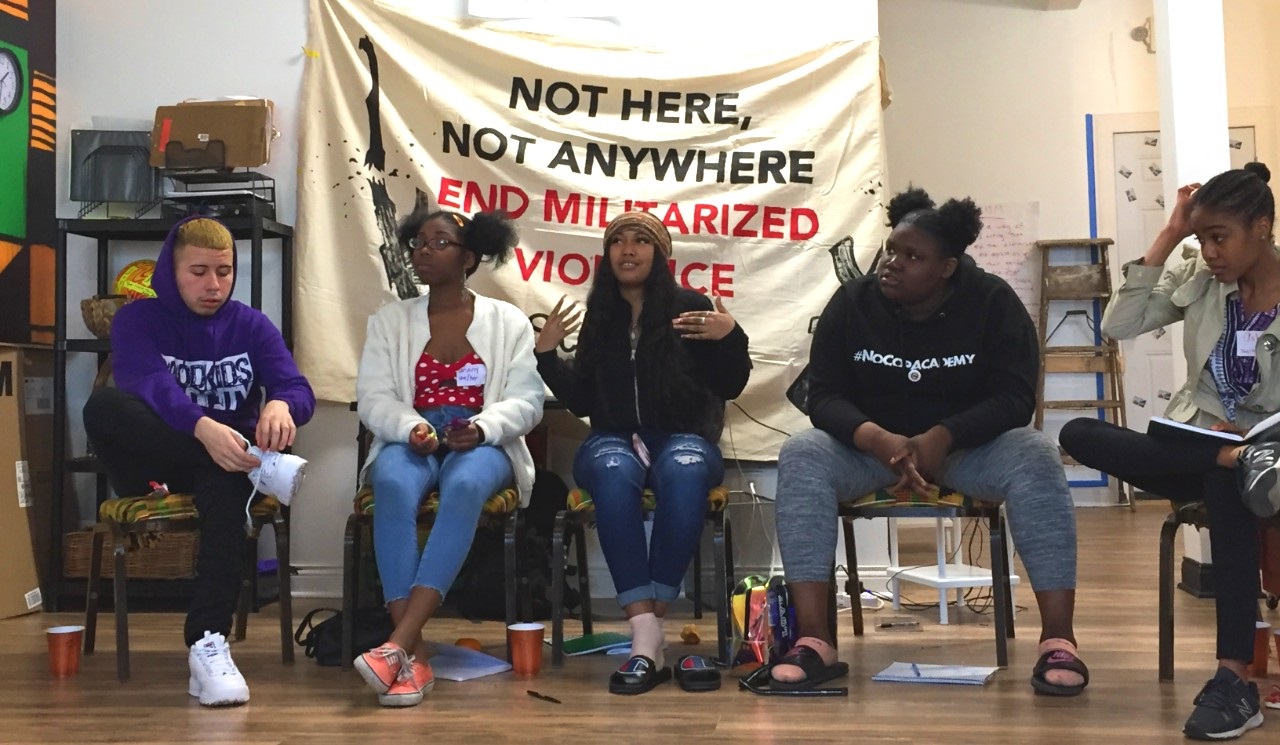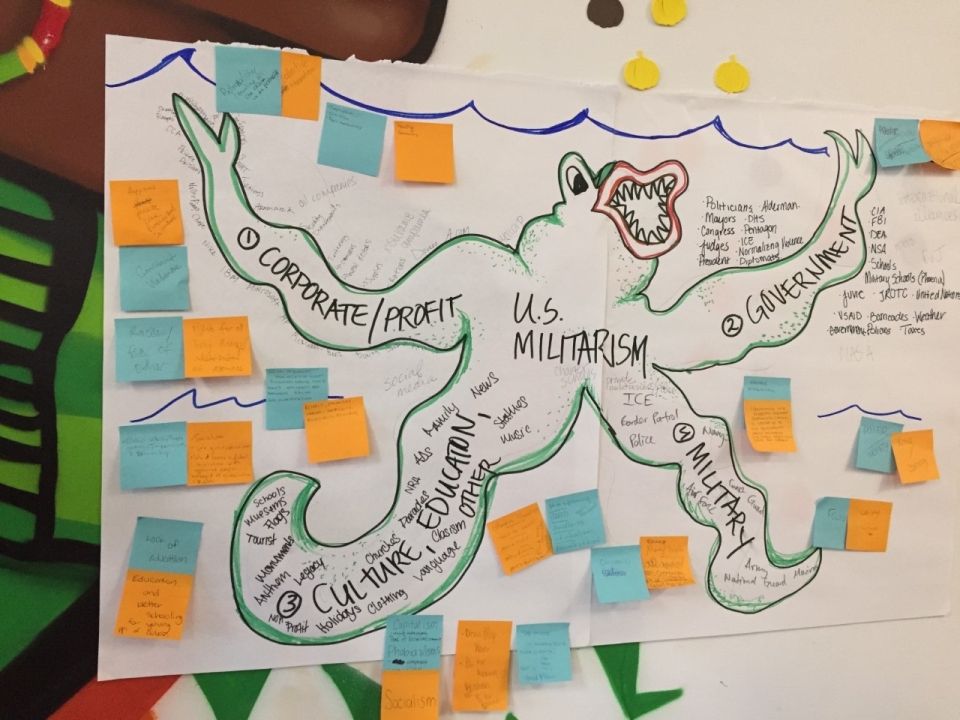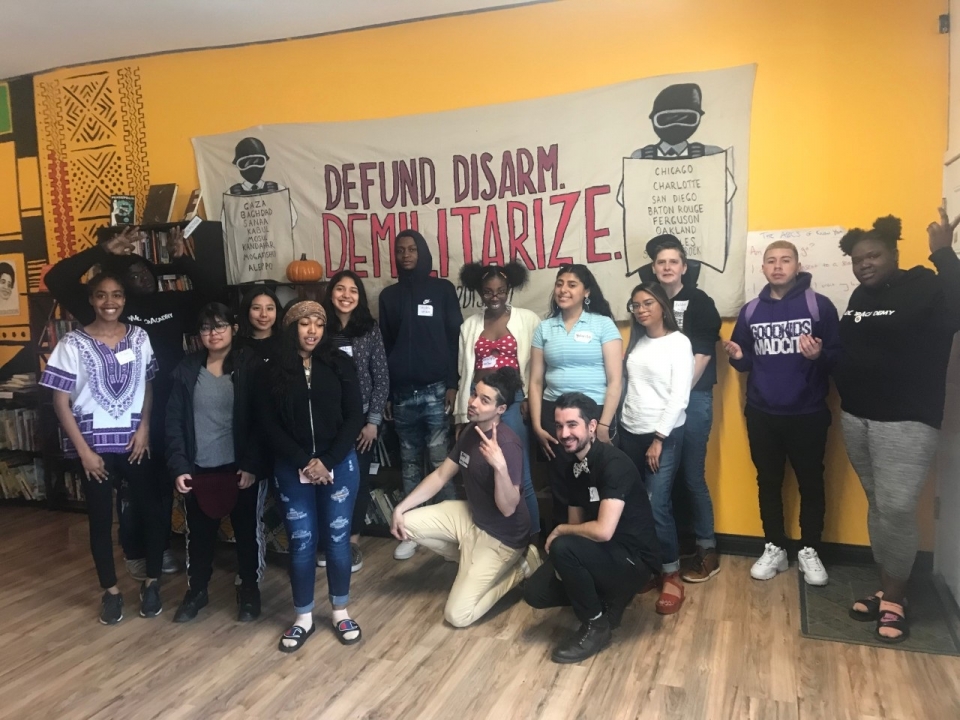
Participants at AFSC's "Demil School" in Chicago. Debbie Southorn / AFSC
Over spring break, a small group of Black, Latinx, and Arab youth from Chicago – most of whom have been involved in the No Cop Academy campaign – took part in our first-ever “Demil School” at Assata’s Daughters headquarters. Together with leadership and funding from the War Resisters League, AFSC offered workshops to help young people explore the role of militarism and the military industrial complex in our lives and communities.
It was an exciting, generative space, where we all built knowledge together.
As a facilitator, here are a few lessons I took away from our time that I offer to others invested in making stronger links between local and global struggles against militarized violence:
Militarization isn’t what makes policing bad - but we do need to stop it.
When we talked about police militarization together, one of the first things we agreed on was that too often white people and/or those who haven’t experienced police violence first hand are outraged about the perceived excess of force when it comes to police militarization. Like cops with guns and batons aren’t a problem, but automatic weapons and tanks are just too much. Together we rejected that entirely and affirmed that policing is inherently militaristic because it’s about controlling people by force.
That said, the specific programs, tactics and trainings that are giving local law enforcement even more tools to repress and oppress Black communities and communities of color need to be stopped. These include things like the 1033 program, which allows the Pentagon to give military equipment to local police departments; SWAT trainings and conferences, like Urban Shield which was recently defeated in Oakland after years of organizing; gang databases, which allow for sweeping surveillance of entire communities; and the COPS program of the Department of Justice, which prioritizes hiring military veterans for law enforcement. Police militarization is expanding the arsenal and reach of local law enforcement in terrifying ways and at an accelerating pace, and our fight against it has to stay clear and principled so we don’t fall for the spectacle alone.
U.S. airwars are basically about globally policing North Africa and Southeast Asia.

First off, when we say airwars, we’re talking about the ways that modern warfare has really shifted away from boots on the ground occupations toward relying on both manned and unmanned aircrafts to drop bombs on targets instead. We learned that the U.S. military alone dropped bombs on people in 11 countries last year, despite that we aren’t formally at war with ANY OF THEM.
So where did airwars come from? The British and French were the first to drop bombs out of airplanes around the time of World War I, and it was to repress early anti-colonial uprisings in Africa and Asia. But at the time, it was considered so morally reprehensible that there were entire movements to abolish air-policing. Fast forward a century, and the imperialist powers have returned to the doctrine of policing from the skies, now using the rhetoric of the “War on Terror” (instead of more overtly racist colonial reasons) to justify horrid crimes against humanity and to call their victims ‘combatants’ after they kill them from the sky.
Displacement is awful and violent, and happens not just when bombs are dropped or bullets fired, but also to make room for the infrastructure of militarized violence.
We watched powerful testimonies from the indigenous people of the Chagos Islands, who were forcefully displaced from their island so that the British could build a base there in the 1960s. With over 700 U.S. military bases worldwide, we can only imagine how many other people and communities have lost access to their homelands and/or precious, sacred sites.
We were also able to make connections between this kind of displacement abroad and the ways that construction of new prisons, jails, immigrant detention centers, and police stations also displace people here in the U.S. In Chicago, a central part of our fight to stop the new $95 million dollar police academy through our No Cop Academy campaign is the ways it is going to accelerate the pushout of Black people from the westside of Chicago.
The military, like police departments, is preying on our young people. And it’s painful. And scary.
Recruitment for the military has actually been down in recent years, and public support for U.S. warfare abroad is at an all-time low. So the Department of Defense is using new tactics, especially online targeted ads and recruiting, to get vulnerable, poor, Black and brown young people to join up. Similarly, police departments have been facing a PR crisis in light of the Movement for Black Lives, and have stepped up their efforts to enlist more Black and brown recruits.
We heard from a bad-ass Black organizer in Chicago who joined the military six years ago and was loud and clear about the ways that recruiters can and will lie to get you to join. We were reminded that this kind of information is power. We need counter-recruiters on the streets and in the halls. Young folks left the training committing to telling their friends and neighbors about the risks of talking with recruiters, not to mention joining up. And for young participants who currently have friends, family, or are themselves enlisted, we were reminded of how scary and hard it is to escape.
Young people of color are getting it and are ready.

Despite the overwhelming, sad, and scary truths we confronted, I was most blown away by the ways that the teens in the room from all across the city and all different levels of familiarity with community organizing and/or “politics” were able to make these connections quickly and confidently and are already dreaming up ways to further undermine militarism. They asked for follow-up resources, filled flip chart papers with questions, and when asked whether we should organize more “demil schools” answered with a resounding “yes.”
Even though the military industrial complex has reaches in almost every institution in our society, formal organizing and/or opportunities to directly learn about and confront its harms have become far and few between. We have to change that. Call out recruiters on campuses and in neighborhoods. Block and report social media ads that glorify the U.S. military. Resist police violence in all its iterations. Support communities of color fighting displacement and call out the ways law enforcement is complicit in kicking people out of their homes. Demand resources for communities and jobs that affirm life rather than require people to participate in violence and harm.
We can’t afford not to make these connections. We can expand the reach and visions of our fights for justice and liberation.